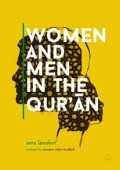Abstract
Istikhlāf, a key Qur’ānic concept that testifies to the intimate relationship of men and women to the Creator, carries at least three levels of meanings: khalīfa evokes the notion of ‘‘succession’’; the plural, khalā’if, designates those who succeed one another; the third, khilāfa (lieutenancy), granted by God to humans only, is a matchless mark of regard and a huge responsibility—the preservation of God’s Creation with all of its riches. Humans as khalīfa are not “representatives” of God on Earth, in the literal sense; they are the custodians of the mission that the Creator has entrusted to them as amāna (trust). Several Qur’ānic verses evoke the concept of khilāfa in close equation with “good action” (al-‘amal as-sālih), faith (al-īmān), but also altruism and generosity (al-infāq).
Access this chapter
Tax calculation will be finalised at checkout
Purchases are for personal use only
Notes
- 1.
The Qur’ān 6:165; 10:14, 73; 2:30; 38:26.
- 2.
The Qur’ān 2:30.
- 3.
Ismail ibn Kathir, Tafsīr ibn Kathīr , commentary on verse 30 of sūrah 2. Ismail ibn Kathīr (1300–1373) was a Syrian Sunni Muslim theologian and scholar best remembered for his fourteen-volume history of Islam, Al-bidāyah wa al-nihāyah (“The Beginning and the End”), and his well-known commentary on the Qur’ān, Tafsīr al-Qur’ān al-Al’adhīm (“The Interpretation of the Glorious Qur’ān”), in which he linked certain hadiths or sayings of the Prophet to verses of the Qur’ān in order to explain the meaning and intention of various verses and sūrahs.
- 4.
The Qur’ān 2:164.
- 5.
The Qur’ān 6:99.
- 6.
Souleymane Bachir Diagne speaks of this liberty, which manifests itself at the inception of the human being: “the Qur’ānic story of the appearance of human beings seems to recognize that he is the custodian of a treasure that only he can manifest: freedom,” in Comment philosopher en islam? (Edition de Panama, 2008).
- 7.
More than 300 verses of the Qur’ān speak about mankind’s responsibility regarding his own actions (9:120; 49:19; 47:33).
- 8.
The Qur’ān 24:55; 57:7.
Author information
Authors and Affiliations
Rights and permissions
Copyright information
© 2018 The Author(s)
About this chapter
Cite this chapter
Lamrabet, A. (2018). The Construction of Human Civilization. In: Women and Men in the Qur’ān. Palgrave Macmillan, Cham. https://doi.org/10.1007/978-3-319-78741-1_6
Download citation
DOI: https://doi.org/10.1007/978-3-319-78741-1_6
Published:
Publisher Name: Palgrave Macmillan, Cham
Print ISBN: 978-3-319-78740-4
Online ISBN: 978-3-319-78741-1
eBook Packages: Religion and PhilosophyPhilosophy and Religion (R0)

